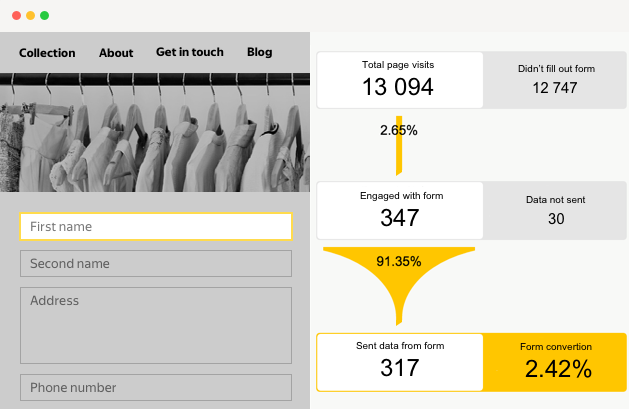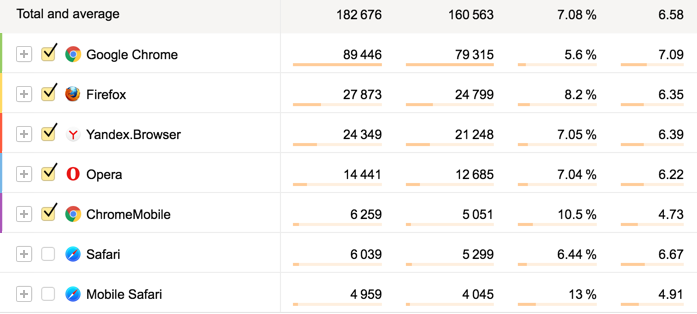
If you’re looking to break into the Russian online market, you’ve probably come across the search engine Yandex. At this point, you likely already want to optimize your site for Yandex SEO. However, before you start loading your site with Russian backlinks, let’s take some time to break down this search engine.
Just because you’ve optimized for Google doesn’t mean you’re fully optimized for Yandex. Fortunately, by the time we’re done here, you’ll walk away with both an improved site and a strong understanding of what makes this Russian powerhouse of a search engine so unique.
What Is Yandex?
Yandex is one of the Russian Federation’s leading search engines, making up nearly 60 percent of the Russian search engine market share. With 85 million monthly users, Yandex is the most visited online resource in Russia.
Think of Yandex as the Google of Russia. Of course, they dominate the search engine space in Russia, but that’s just the tip of the iceberg. Yandex supports Russian users with everything from food delivery and maps to news and a voice assistant.
While it may function a bit differently from the search engines you already know and love, Yandex can still be a powerful tool when leveraged properly.
If you’re looking to expand your brand into Russia, you’re going to want this search engine on your side. Plus, as one of the top five search engines worldwide, your brand can’t afford to be invisible to Yandex. That’s just leaving money on the table!
Why Should You Optimize for Yandex SEO?
Don’t make the mistake of thinking that this is a Bing versus Google situation. If you’re trying to break into the Russian market, Yandex is not optional.
Of course, the reason you’ll need to optimize is because it doesn’t operate the same way other search engines do. They prioritize different elements and focus on different factors.
When it comes to technical SEO, Yandex struggles with crawling and indexing JavaScript websites. Single-page applications developed in JavaScript aren’t pre-rendered or indexed by Yandex.
Yandex can use unique content result blocks and snippets to augment a search results page, just like Google. However, with Yandex, you can see how eligible you are for different result types. You’ll be able to easily identify the issues that impact your eligibility and optimize accordingly.
We’ll tackle the difference in behavioral factors and how certain signals impact your search results later, but for now, it’s worth mentioning that Google and Yandex don’t value the same factors equally.
Google may give user behavior signals some unspecified importance, but Yandex couldn’t be clearer. User signals matter to Yandex and their users, from traffic sources and search queries to platforms and conversions.
Yandex has its own unique frequency when it comes to SEO, which means that having a successful SEO marketing strategy depends on whether or not you can properly optimize.
Why Does Yandex Matter for Local SEO?
It’s important to keep in mind that local SEO works a bit differently in Russia. Since 2006, Yandex has allowed users to sift through national or regional search results. Yandex checks certain signals like your website’s IP address, contact info, and domain registration.
Why does that matter? Well, if any of that information is wrong or mislabeled, you likely won’t rank highly in local searches, regardless of your marketing strategy. Fortunately, Yandex’s Webmaster service can make regional binding a simple process.
Time after time, Russian consumers have shown they prefer relying on Yandex for their search engine needs. More importantly, trying to navigate the local SEO landscape without Yandex makes your marketing efforts significantly less effective, especially if you want to compete with established local brands.
If you want to dominate local Russian SEO, you’ll need the search engine that more than half of the country uses. When you’re optimizing for local SEO, it’s crucial that you make it as easy for locals to interact as humanly possible. It may take a bit of work to fully optimize for this search engine, but that’s the price of smart marketing.
7 Best Practices for Organic Yandex SEO
Now we understand how valuable Yandex can be to your brand. The only question left is how to properly optimize your site for Yandex.
Let’s start by taking a look at one of the pillars of effective SEO practices, maximizing the value of your copy.
1. Create Valuable Content
It’s impossible to talk about organic SEO without bringing up content optimization. While it’s always important to create compelling, engaging content, certain techniques can elevate your copy.
Right off the bat, we have to address how Yandex and other search engines use elements like keywords and word counts to determine a site’s ranking.
When it comes to keywords, you’re looking for a three to five percent keyword density. Once you go past 6 to 8 percent, you might be flagged by Yandex’s algorithms. You can be a bit more flexible with word count, but a good rule of thumb is to engage in some competitor analysis. If all the top-ranking results have 2,000 words, your article shouldn’t be 4,000 or 500 words.
As far as we know, Yandex evaluates content using at least two algorithms. Its AGS Filter functions as a way for Yandex to identify low-value content. If you’re familiar with Google’s Panda algorithm, it operates with the same goals in mind.
These low-quality sites are then flagged by the search engine, resulting in significantly lower rankings on the SERPs. In other words, make sure your content is both valuable and well optimized, or no one on Yandex will see your site.
2. Optimize Your Site Experience
The content you create is important, but search engines like Yandex take a more holistic approach when determining how to rank your site. As far as Yandex is concerned, your site should provide both high-quality content and an optimized user experience.
What does that look like? Well, sites with high bounce rates can struggle to rank highly. Bouncing occurs when a user lands on a page and leaves that page without any further interaction. To be clear, the amount of time a user spends on that page doesn’t matter. All that matters is whether or not they interacted with the site in some way.
The savvy site owners among you have probably already noticed that this definition can make bounce rate a tricky metric to account for. After all, let’s say someone clicks on your link and finds the answer they were looking for. Now that they’re satisfied, they don’t really have a reason to interact any further. If they leave at that point, they’ve technically bounced, but the result was still valuable!
Fortunately, Yandex accounts for more than just bounce rate when determining a site’s ranking. Here are some techniques you can implement to create a more engaging site experience for users.
Increase your website loading speed, address problem areas on your site using heat maps, and ensure your content is easy to digest. If you already have a massive library of content, take some time to batch relevant articles together. Not only can this reduce your bounce rate by leveraging a user’s interest, but it can also improve the navigational experience for your users.

3. Understand Meta Tags
Those of you with a background in Google SEO are likely familiar with meta tags and their importance. What you may not know is that Yandex takes meta tags much more seriously. In fact, sites with even slight meta tag mistakes can struggle to rank highly on Yandex.
Here’s how you’ll want to approach meta tag optimization for Yandex SEO. When it comes to title and description tags, your titles can be longer than Google’s. Still, your best bet is to hover around 60 characters, and you should aim to have 160-character description tags.
Also, if your tags are created automatically, check them! If they aren’t high quality, your site could easily drop in ranking. As for meta keywords, add a few target keywords per page.
While Russian speakers tend to use Cyrillic characters for their URLs, Yandex understands both Cyrillic and Latin characters.
When dealing with similar pages within your site, canonical tags function as a way to avoid potential issues with duplicate content. Keep in mind that even if you specify rel=canonical, Yandex won’t consider that an order. It can ignore it for a variety of reasons.
4. Make Your Site Mobile Friendly
The concept of making your website mobile-friendly is nothing new, especially after Google made AMP such a powerful SEO tool. Similarly, Yandex highlighted the value of mobile-friendly sites within their search engine. They even launched Turbo pages, which launched up to 15 times faster than standard pages.
Fortunately, the usual mobile optimization rules apply here. Keep your web design simple, make sure all your multimedia elements load quickly, make your buttons large enough to work on mobile. The key here is to maximize ease of navigation and consumption.
Optimizing your site for mobile is fantastic for your SEO, but it’s also an effective way to improve your user experience. Faster load times mean less waiting, which leads to more time engaging with your brand. You can review your mobile pages using the Yandex Webmaster tool. Oh, and here’s a quick tip. Click on the tab on the lower right side that says “Ru” and click “En” to switch the language.
5. Analyze User Happiness
We’ve spent a lot of time covering the similarities between Google SEO and Yandex SEO, but it’s worth mentioning that Yandex has slightly different objective focuses. To put it bluntly, Yandex puts a massive emphasis on what we’ll call “user happiness.”
Let’s break user happiness into two categories: site quality and user behavior. In other words, Yandex evaluates whether your site is worth showing users and then how useful your site was for those users.
How does Yandex do this? It uses everything from user behavior signals to click-through rates to determine your positioning within both the Site Quality Index and on the SERPs.
When optimizing for Yandex SEO, you’ll need to analyze your traffic sources and optimize based on which sources are bringing the most visitors to your site. Your user search queries and target pages, as well as your platform specs, are all considered when determining your user happiness, so make sure you consider those metrics when optimizing.
Beyond that, Yandex uses an ICS score to evaluate the quality of your website. As far as Yandex is concerned, it’s not enough to provide the right answer with your copy. Your overall site experience should maximize user happiness.
Yandex tracks this by evaluating the number of visits users make, the amount of time users spend on your site, and even whether they clicked on any ads! They then combine these results with human-completed surveys to determine a site’s accuracy and readability.
6. Don’t Overuse Backlinks
While this might not be a particularly complex point, it’s still a pretty important one. If you’re coming from the world of Google SEO, here’s your word of warning. Backlinks might mean a lot to Google, but Yandex doesn’t rank them particularly highly. In fact, certain Yandex algorithms can severely punish your site if you’re using too many irrelevant links.
To be clear, there’s nothing wrong with relevant, valuable links that bring in traffic. But if your links don’t attract traffic? The Minusinsk algorithm is more than happy to restrict your site.
7. Leverage Yandex Metrica
Yandex Metrica is essentially their version of Google Analytics, with a few interesting features tacked on.
Their ability to detail user retention metrics is particularly useful, breaking down users by both session and goal completions. Of course, we can’t talk about Metrica without talking about their use of heatmaps.

Since it’s directly tied into your analytics, you’re able to easily compare custom segments. That means you’ll have clear visual clarity when it comes to the differences between User Group A and User Group B. Beyond that, you’ll be able to change date ranges and even add session criteria to your analysis.

Yandex SEO Frequently Asked Questions
Is Yandex better than Google?
How does Yandex search work?
How does Yandex compare to other popular search engines?
As far as objectives go, Yandex has the same end goal as other popular search engines. Identify the best, most relevant answer and provide it to users.
What are some challenges of SEO for Yandex?
Yandex SEO Conclusion
It’s easy to look at Yandex and imagine that it’s some impenetrable search engine that only a local could ever understand.
Fortunately, the reality is that Yandex has the same goals and objectives as any other reputable search engine. As long as your site is getting the best answers to the right people, Yandex will help your brand increase its visibility.
The key is to keep track of the slight differences in SEO optimization and, above all, protect the average user’s time and experience as much as possible.
Which of these Yandex SEO practices are you most excited to start implementing? Let me know in the comments below.
from Blog – Neil Patel https://ift.tt/3Gtpy0W
via IFTTT
No comments:
Post a Comment